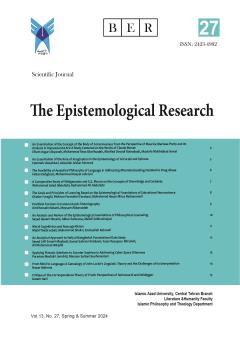Examining of imagination from the points of wiew of Farabi and Spinoza
Subject Areas : Epistemological researchesfatemeh shoushtari 1 , Azizollah Afshar kermany 2
1 - آموزش و پرورش
2 - هیات علمی
Keywords: intellect, imagination, divine revelation , Farabi, Spinoza,
Abstract :
Imagination is a mental activity with which we can imagine an event free from its temporal and spatial characteristics. This function of the mind provides us with the necessary conditions for secondary and internal observation of primary external observations. In a way, it can be said that imagination plays a fundamental role in human perception and not only makes a person capable of advanced theoretical understanding, but also gives a person the necessary ability to capture the outside world and achieve their goals. Farabi and Spinoza both paid attention to the importance and use of imagination. In a way, it can be said that for both, imaginative cognition is an important pillar in human perception. Farabi considers the re-summoning of the sensory form after its absence and the ability to analyze and combine sensory forms after the absence of sensory observation as the primary role of the imagination, which not only gives a person the ability to go beyond sensory perception and recognize external observations and their similarities, but also It prepares the human mind to understand the general perception. In a way, it can be said that the power of imagination is the link connecting sensory perceptions with intellectual perceptions. Spinoza considers the perception caused by the body's impressions from the outside world as vague experience or imaginative perception because this type of perception does not give us knowledge about the truth of objects and their relationships, and only gives us vague ideas that are useful for our living. Therefore, although Farabi accepts the realism of imaginary sensory perception, Spinoza places practical value on them and does not place theoretical value on them, and considers imagination to include sensory, experimental, and imaginary perceptions, knowledge resulting from the frequency of general concepts and even false notions.
اسپینوزا، باروخ .(1364). اخلاق، ترجمۀ محسن جهانگیری، تهران: مرکز نشر دانشگاهی.
همو.(1400). رساله الهی سیاسی ، مترجم علی فردوسی ، تهران ، شرکت سهامی انتشار.
همو .(1374). رساله در اصلاح فاهمه ، ترجمه اسماعیل سعادت ، تهران ، مرکز نشر دانشگاهی.
همو.(1382).شرح اصول فلسفه دکارت و تفکرات مابعد الطبیعی ترجمه محسن جهانگیری ،تهران ، انتشارات سمت .
اسکروتن، راجر .(1376). اسپینوزا ، ترجمه اسماعیل سعادت ، تهران ، طرح نو.
بریه ، امیل .(1385). تاریخ فلسفه قرن هفدهم ، ترجمه اسماعیل سعادت ، تهران ، هرمس.
پارکینسون، جان هنری .(1380). نظریه شناخت اسپینوزا، ترجمه سیدمحمد سیف، تهران، انتشارات علمی و فرهنگی.
پورحسن، قاسم .(1400). نظام معرفت شناسی؛ بازخوانی بنیان¬های معرفتی فارابی، تهران: انتشارات صراط.
داوری اردکانی، رضا .(1377). فارابی: مؤسس فلسفه اسلامی. تهران: نشر پژوهشگاه علوم انسانی و مطالعات فرهنگی.
فارابی ، ابونصر.(1996). آراء اهل المدینه الفاضله ، تحقیق و مقدمه البیر نصری نادر، بیروت ، دارالمشرق.
همو.(1412). التنبیه علی سبیل السعاده ، تحقیق و مقدمه جعفر آل یاسین ، حکمت ، تهران.
همو .(1392). التعلیقات ، مقدمه و تحقیق سیدحسین موسویان ، موسسه پژوهشی حکمت و فلسفه ایران ، تهران.
همو .(1376). السیاسة المدنیة، تصحیح و ترجمه حسن ملکشاهی، تهران، سروش.
همو .(1381). فصوص الحکمه، شرحه للسید اسماعیل الحسینی الشنب غازانی مع حواشی میر محمد باقر الداماد، تحقیق علی اوجبی، تهران: انتشارات انجمن آثار و مفاخر فرهنگی.
همو .(1382). فصول منتزعه، ترجمه و شرح دکتر حسن ملکشاهی، تهران: نشر سروش.
نتون، یان ریچارد .(1381). فارابی و مکتبش. ترجمۀ گل بابا سعیدی. تهران: نشر نقطه.
نقیب زاده ، میرعبدالحسین .(1364). فلسفه کانت بیداری از خواب دگماتیسم ، تهران ، انتشارات آگاه.
هاملین ، دیوید ،و .(1374). تاریخ معرفت شناسی ، ترجمه شاپور اعتماد ، تهران ، پژوهشگاه علوم انسانی و مطالعات فرهنگی.
Curley,Edwin.(1969).spinoza,s metaphysics,an essay in interpretation,Cambridge ,mass,Harvard university press.
Deleuze,gilles.(1889 spinoza,A practical philosophy trans Robert hurley , sanfrancisco, city lights books.
Norris , Christopher.(1991). Spinoza and the origins of critical theory , oxford , Blackwell.
Negri , Antonio.(1991). The savage Anomay , the power of spinoza,s metaphysics and politics , translated by Michael hardt , university of Minnesota press.


